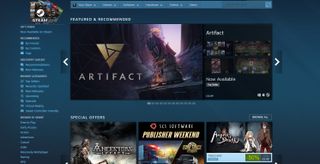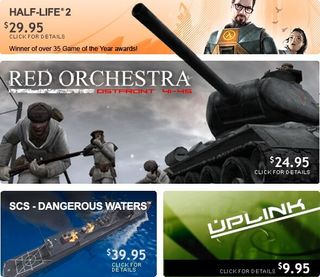What indies think of Valve giving more money to big sellers
Even after changing the revenue it shares with high-earning games, discoverability on Steam is the bigger issue for some devs.

The last 10 years of PC gaming have been defined by Steam's emergence as the de facto PC games store. The next few might be defined by the competition to it.
With Epic announcing yesterday that its Fortnite launcher will become a full-fledged digital games store with fortnightly free games, the company joins a list of Steam rivals in GOG, Origin, Discord, Xbox, and Battle.net that is larger than ever. Epic's store will offer developers a more favorable revenue split than Steam, even after Valve eased its revenue share last Friday from a flat 30% cut to a 25% cut (for sales beyond $10 million) that improves further to 20% after $50 million in sales.
In light of these changes to how Valve shares money, I asked a mixture of developers at small studios and independent creators what they thought, and where their relationship with the company stands today.
Some smaller creators feel shunned
The strongest criticism I heard of Valve's new revenue model was that it draws an exclusionary line between indies and large publishers. "This move is Valve explicitly saying indies are less valuable on their platform, and whatever way you put that, that hurts," says Adriaan de Jongh, creator of Hidden Folks.
"I understand their reasoning, but it's terrible PR," says Cliff Harris, of Positech Games, told me via email. "The revenue tiers seem insanely high to an indie dev. They also seemed totally oblivious to how this would look to an indie … Right now Epic are coming across as the good guys. Valve are starting to look out of touch." Harris' criticism echoed another comment from Petri Purho, founder of Nolla Games, who are working on a promising rogue-lite called Noita: "I think it is a good thing that Valve is open about their agreements, they could have very easily kept this hidden and just between the big companies. But it is a bad PR move, since the rich getting richer is not the most popular thing right now."
Paul Kilduff-Taylor, one of the creators of the recent Frozen Synapse 2, says that because most of Steam's revenue will come from a handful of big-earners like PUBG and ARK, it's sensible for Steam to take steps to retain them. But at the same time, Kilduff-Taylor says, "it's commercially vital that obscure titles without a huge marketing spend have the ability to break through, and it's critical for games as a medium to maintain the ability of smaller creators to make a living."

Several respondents argued that flattening Steam's revenue cut would be a welcome change. Tripwire Interactive released one of the first third-party games on Steam way back in 2006, and its CEO John Gibson told me that while he's happy that Valve is getting more revenue into the hands of those who make games, "We do think it would be best if it were an even playing field for all involved," Gibson said. "The PC digital distribution space is on the verge of some big changes. Battle.net is selling third party games, Origin is growing, and new platforms are on the horizon. Things are about to get very competitive for Steam in this space, and they will likely need to look at the value proposition they offer developers to remain competitive. A big step here could be to increase the royalties they offer developers across the board."
The biggest gaming news, reviews and hardware deals
Keep up to date with the most important stories and the best deals, as picked by the PC Gamer team.
Harris was blunter: "[Valve] should match Epic's deal, across the board, immediately." Ditto the de Jongh: "Now that Valve has made it clear that they can have games on Steam for 10% less, I would like to see them bring that change to everyone."
A few veteran devs I contacted argued that Steam's new monetary split does represent a good deal, historically speaking. "Their current revenue sharing scheme is more generous than the industry average," wrote Stardock's Brad Wardell, who called the move a good first step in retaining major publishers as the distribution of PC games continues to fragment. "It is worth nothing that Valve continues to pay for the engineering and bandwidth costs for its own competitors selling Steam keys," continued Wardell. "Thus, those who would call for Valve to lower its revenue sharing further may want to keep in mind that the current, more generous than industry standard revenue sharing scheme they currently have also pays to subsidize its own competitors to foster a more healthy PC game market."
"I came in at the onset of digital distribution and I remember how awful retail sales were. 70%? You were lucky if you got 20% from the sale of a boxed game," says Larry Kuperman, director of business development at Nightdive Studios. "Competition drives innovation. Always has, always will," Kuperman added, referring to Epic and Discord, which his studio will publish on.
Wow @GreyAlien wasn't kidding. In October @steam_games did something that killed traffic to loads of indie games. Here's mine. Look at that baseline drop to 0. Hmm. pic.twitter.com/8lOnOtT3FnDecember 2, 2018
Concern and uncertainty around Steam discovery
Many of the developers I spoke to brought up discovery within Steam as a bigger issue. Hidden algorithms decide which games surface within prominent areas of Steam. A recent Steam bug among those algorithms sent considerably less traffic to many games, and prompted wide-ranging criticism of the issue this week on Twitter.
"A productive discussion needs to keep happening around discovery and the value of Steam's contribution to that," said Kilduff-Taylor. "Personally, I'd rather focus on discovery than the revenue share."
"A lot of the challenges Valve faces has to do with the challenge of discoverability which even Amazon has not been able to resolve in the age of the Kindle. Many independent developers are excellent engineers and artists but not necessarily familiar with the limitations of analytics or the current state of machine learning to help customers reach them," wrote Wardell, who recommended that Valve could create an affiliate program to encourage gaming commentators and other third-parties "to help mitigate the discoverability challenge."
I am incredibly grateful and thankful for Steam throughout the past decade of indie game development in general, and game development as my personal pursuit.That being said: it is time for them to start facing some serious competitors.December 4, 2018
"The big problem with Steam and indies is discoverability. There's just too many games. Previously the 30% seemed like a very fair deal, since you were 'guaranteed' a certain amount of visibility in the store, which would result in certain 'guaranteed' number of sales," says Purho, of Finnish developer Nolla Games. "Now the situation is very different. There's no guarantee that your game will get any real visibility on Steam. So you have to build your own audience for your game … There's a magical algorithm which can direct a huge amount of traffic to your game if you manage to please it. What this has created is a lot of superstition about what needs to be done to please the algorithm."
"To a degree Valve is struggling under the weight of their success, and their great intentions of giving all game developers a path to market opened up the floodgates," says Tripwire's John Gibson. "This has resulted in thousands of developers with games on Steam, and over five thousand games a year being released. That makes it very challenging for Valve to give every developer personal attention, and makes discoverability of new games challenging. So it is a tough time to be an independent developer on Steam. In our chats with Valve it is clear they have heard developers and are working toward addressing developer's concerns."
Everyone loves working with Valve, basically
Despite the opaqueness of discoverability within Steam, the developers I spoke to offered near-unanimous praise of how Valve works with them. Most of the participants have released multiple games over a number of years on Steam, which may omit the perspective of developers who have just taken their first steps on the platform.
"Our experiences with Valve have been universally positive," says Wardell. "In the many years we've worked with them, I can honestly say that we've found them forthcoming, reasonable and willing to listen to feedback."
"Valve makes a great many outreach efforts to indies," Tyler Sigman, one of the co-founders of Darkest Dungeon creator Red Hook Studios, told me. "They regularly have 'learning lunches' at their office where indies of all sizes are invited to come and share feedback, challenges, feature wish-lists, and concerns to Steam-side employees. They host indie networking dinners and mixers at most conferences. As an indie developer, initiatives like those have always impressed me and provided real value."
"In my own personal experience—and I would like to stress that I'm not denying the experience of others here—I've always found Valve to be exceptionally approachable and keen to listen to any issues that developers might have," says Kilduff-Taylor. "We've got to work with great people like Augusta Butlin, who has gone above and beyond to help us with all our releases, and Tom Giardino who is always looking to improve the flow of information between Valve and indie devs. I hugely appreciate all of the hard work that's been done by individuals at Valve to help indies over the years, and it deeply frustrates me that this often isn't recognised during this type of conversation."
"We have a great relationship with Valve and can still pick up the phone and call people over there to chat when we need to," says Gibson, who admits that not every dev has that same experience because of the sheer volume of people publishing games on Steam today. This mirrors de Jongh's feedback, who told me: "I think indies on Steam can be separated into two groups: those who are able to tap into Steam's large audience, and those who are not. Most indies that are able to tap into Steam's audience have a human contact at Valve, and once you get to that level, Valve is a bunch of wonderful and friendly dudes always willing to hear your thoughts and feedback. For indies who are not able to tap into Steam audience, Valve is a black box."
"I've always liked Valve, and have a good relationship with them, but I do hear a lot of negative talk about them in the last few months," Harris told me. "I don't think relationships between Valve and indie devs have been this bad for a long time, but it can still turn around. Everyone is waiting to see what happens next, basically."

Evan's a hardcore FPS enthusiast who joined PC Gamer in 2008. After an era spent publishing reviews, news, and cover features, he now oversees editorial operations for PC Gamer worldwide, including setting policy, training, and editing stories written by the wider team. His most-played FPSes are CS:GO, Team Fortress 2, Team Fortress Classic, Rainbow Six Siege, and Arma 2. His first multiplayer FPS was Quake 2, played on serial LAN in his uncle's basement, the ideal conditions for instilling a lifelong fondness for fragging. Evan also leads production of the PC Gaming Show, the annual E3 showcase event dedicated to PC gaming.
Most Popular


